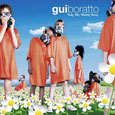Gui Boratto Take My Breath Away
While Germany remains the center of the techno universe, Gui Boratto certainly continues to raise […]

While Germany remains the center of the techno universe, Gui Boratto certainly continues to raise the question about exactly where our attention should be focused. Sure, artists like Villalobos and Luciano have previously planted the techno flag for South America, but it’s the Brazilian Boratto who is doing something truly different from Europe’s entrenched minimal milieu. Take My Breath Away is Boratto’s second album, and it continues to explore the same colorful, joyous sounds that littered his widely acclaimed 2007 debut, Chromophobia.
Opening with the title track, Boratto quickly establishes that he hasn’t grown gun-shy when it comes to making big, sonorous tunes; “Take My Breath Away” features an ebb and flow of pulsing keys over his meticulously crafted beats. That’s followed by “Atomic Soda,” which jacks up the intensity even further with its commanding use of fuzzy, distorted synth sounds during the song’s crescendos. Audion-soundalike “Ballroom” is another stormer, working the low end of the spectrum before giving way to a warped apex that sounds like a fax machine gone haywire. In a time where artists routinely overload their tracks with similarly blown-out tones, it’s incredible to hear how Boratto’s music remains silky-smooth, even when the distortion knob is cranked.
Yet Take My Breath Away is much more than a collection of club bangers. “Colors” switches things up with a skittery breakbeat and a relaxed feel, not to mention wave after wave of shining melody. “Les Enfants” is a playful slice of leftfield electronic pop that eschews steady percussion to focus on the interplay of a dizzying number of precisely edited synth sounds. Album closer “Godet” is a sparse, virtually beatless affair that colors a dabbling piano with the soothing hum of radio fuzz, while “Besides” is a downtempo groover that combines bubbling keys with guitar chords that wouldn’t have sounded out of place on one of New Order’s sunnier efforts.
The album is almost entirely instrumental, save for the stellar “No Turning Back.” With vocals provided by Boratto’s wife, Luciana Villanovia (who previously stepped up to the mic on Chromophobia’s “A Beautiful Life”), the track practically screams “future club anthem.” Boratto employs her vocals in a unique fashion, compartmentalizing them into small, pastoral passages, bookended by some of the album’s heaviest beats and swarming keys that almost act like some sort of guitar solo. This inversion is a refreshing change of pace, as Boratto has managed to flip the usual quiet-build-into-vocal-climax formula on its head.
Take My Breath Away is a vibrant, kaleidoscopic album, one that sounds and feels jubilant, despite its complex production and incredible attention to detail. Nevertheless, critics may note that it’s more of an evolution than a revolution for Boratto, who rarely strays from the blueprint of his past work. Yet in the face of a continuing onslaught of drab, minimal offerings from his colleagues on the other side of the Atlantic, perhaps only minor tinkering was in order. Boratto has staked out his own tract of land within the techno commonwealth—he should be encouraged to keep developing it, especially if the fruit it bears continues to be this sweet.

